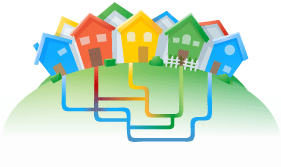Yesterday’s Google Fiber announcement has gotten some press in WaPo this morning. Unfortunately, it has hit one of my pet peeves:
After months of speculation, Google confirmed Tuesday that its ultra-fast Internet service will soon be coming to four more cities — Atlanta, Charlotte, Nashville and Raleigh-Durham, N.C. Those regions, along with more than a dozen cities in their immediate vicinity, will be the latest to benefit from high-speed Internet provided by the search giant.
Uh, sorry to disappoint you, Mr. Fung, but that’s five cities, not four: Atlanta, Charlotte, Nashville, Raleigh, and Durham.
The mayors of both Raleigh and Durham spoke at the press conference yesterday. Both cities’ Chief Information Officers spoke about the project and put in incredibly long hours to get their cities where we are now. Both cities have completely different permitting processes, different infrastructure, different laws and regulations. The way outsiders lump Raleigh and Durham into Raleigh-Durham has always annoyed me (and will be the topic of an upcoming blog post).
And saying it’s just Raleigh and Durham isn’t even accurate, as the nearby municipalities Carrboro, Cary, Chapel Hill, Garner, and Morrisville are also included. These cities’ mayors were also present but are overlooked by the reporter.
It’s just as big a deal to these other cities that they are getting Google Fiber. It would be nice if they got a little credit for their hard work, too.
via These four lucky cities are now officially getting Google Fiber – The Washington Post.


